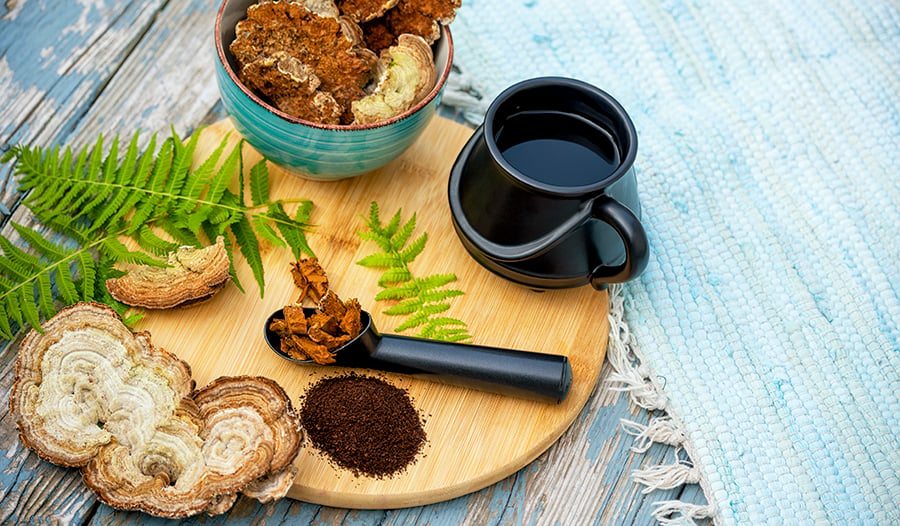Turkey Tail: Uses, Health Benefits, and More

What Is Turkey Tail?
Turkey Tail - or Trametes versicolor - is a fascinating beneficial mushroom with a long history of use in cultures around the world, including in the traditional ethnobotanical practices in China and Japan. And while it has been used for centuries to support wellness, more recently, modern science has demonstrated that when used in the form of supplements, Turkey Tail is well-known for promoting both engaged yet balanced activity of the immune response. It does this by helping the body identify when to encourage the activation of immune cells while simultaneously making sure the immune response doesn’t overreact.
What Is Turkey Tail Used For?
Today, Turkey Tail is one of the most-studied and well-documented beneficial mushrooms. Over the past 30 years alone, more than 400 clinical studies have been published that demonstrate benefits to human health, with much of the research focused on Turkey Tail’s ability to engage immune cells, support immunomodulatory activity, and promote a healthy gut microbiome.
Turkey Tail Health Benefits
A Prebiotic for Your Probiotics
In recent years, the gut microbiome has become a hot topic in the nutraceutical industry. Consumers are increasingly aware of the many benefits to promoting their gut health and are turning to supplements for support. Turkey Tail is a great place to start! As a prebiotic that feeds and increases beneficial probiotic microflora in the gut microbiome and gastrointestinal tract, Turkey Tail helps set the foundation for a healthy immune response and overall wellness.
Gut Microbiome
One 8-week human clinical trial demonstrated that Turkey Tail mushroom extract led to beneficial changes in gut bacteria, promoting the growth and activity of beneficial bacterial genera such as Bifidobacteria and Lactobacilli in the gut. Additionally, research suggests that the polysaccharides in Turkey Tail may support the gut-associated immune response, promote an increase of probiotic species in the gut microbiome, and support the integrity of the barrier tissues lining the gastrointestinal tract.
Immune Response
Research conducted with Turkey Tail mycelium, along with its fermented rice substrate on human blood cells, was found to strongly engage immune cells, support immunomodulatory activity, and support daily tissue generative activity, especially for immune cells. Together, these results appear to indicate Turkey Tail promotes a multifaceted and rapid immune response. Importantly, the support of immunomodulatory activity can facilitate the return of the immune system back to a resting state of watchful waiting, which reinforces an overall state of balance and equilibrium.
Turkey Tail Mushroom Mycelium
If you’re new to Turkey Tail, you may wonder which type of supplement is best for you. There are a lot of options to consider, from capsules and extracts to powder and drink mixes. When it comes to format, it’s often just a matter of what works best for your lifestyle. But another important question to answer is whether you want a Turkey Tail mushroom supplement that uses the fruit body or mycelium. There is compelling data that demonstrates that supplements using a combination of Turkey Tail mycelium and the fermented rice substrate that the mycelium is grown on together robustly support the immune response.
Mycelium and the Fermented Substrate = Complementary Immune Support
In order to grow mycelium for use in supplements, the mycelium is grown using a substrate. Organic brown rice is a popular option because it is a nutritious food source for mycelium and is gluten-free and well-tolerated by most people. As the mycelium grows, it ferments the rice, transforming it into a completely unique substance - much in the same way that tempeh or kombucha are formed - that has been shown to support immune modulatory activity. Together, the mycelium and fermented rice support a strongly engaged yet balanced immune response.
*These statements have not been evaluated by the Food and Drug Administration. These products are not intended to diagnose, treat, cure, or prevent any disease.
References:
- Benson KF, Stamets P, Davis R, Nally R, Taylor A, Slater S, Jensen GS. The mycelium of the Trametes versicolor (Turkey tail) mushroom and its fermented substrate each show potent and complementary immune activating properties in vitro. BMC Complement Altern Med. 2019 Dec 2;19(1):342. doi: 10.1186/s12906-019-2681-7.
- Kidd PM. The use of mushroom glucans and proteoglycans in cancer treatment. Altern Med Rev. 2000 Feb;5(1):4-27.
- Nowak R, Nowacka-Jechalke N, Juda M, Malm A. The preliminary study of prebiotic potential of Polish wild mushroom polysaccharides: the stimulation effect on Lactobacillus strains growth. Eur J Nutr. 2018 Jun;57(4):1511-1521. doi: 10.1007/s00394-017-1436-9.
- Pallav K, Dowd SE, Villafuerte J, Yang X, Kabbani T, Hansen J, Dennis M, Leffler DA, Newburg DS, Kelly CP. Effects of polysaccharopeptide from Trametes versicolor and amoxicillin on the gut microbiome of healthy volunteers: a randomized clinical trial. Gut Microbes. 2014 Jul 1;5(4):458-67. doi: 10.4161/gmic.29558.
- Quayle K, Coy C, Standish L, Lu H. The TLR2 agonist in polysaccharide-K is a structurally distinct lipid which acts synergistically with the protein-bound β-glucan. J Nat Med. 2015 Apr;69(2):198-208. doi: 10.1007/s11418-014-0879-z.
- Saleh MH, Rashedi I, Keating A. Immunomodulatory Properties of Coriolus versicolor: The Role of Polysaccharopeptide. Front Immunol. 2017 Sep 6;8:1087. doi: 10.3389/fimmu.2017.01087.
- Torkelson CJ, Sweet E, Martzen MR, Sasagawa M, Wenner CA, Gay J, Putiri A, Standish LJ. Phase 1 Clinical Trial of Trametes versicolor in Women with Breast Cancer. ISRN Oncol. 2012;2012:251632. doi: 10.5402/2012/251632.
DISCLAIMER:This Wellness Hub does not intend to provide diagnosis...
















































































 Table of Contents
Table of Contents















